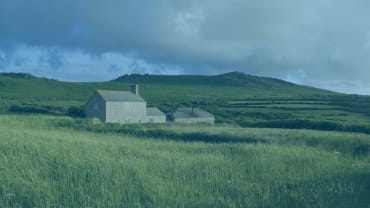A path to a 'new normal' has been set, requiring us to adapt to a new lifestyle and way of working. To an extent, that adjustment has spread to the rural sector too, in the form of online livestock sales and digital bidding.
'Zoom' is no longer just associated with a JCB Fastrac. And the 'Pick for Britain' campaign call has been answered by people in the UK, able and willing to work in the horticulture sector.
It's evident that change is possible, and as the Scottish Government and industry turn their attention to Scotland's economic recovery – there's real opportunity for the rural sector to shine.
The Scottish Council for Development and Industry (SCDI), which represents a cross-section of the private, public and social economy sectors, has published a green recovery plan focusing on environmental measures to revive the economy.
The plan presents a compelling case for investing in a cleaner, greener society that would aid economic recovery while maintaining the Scottish Government's existing focus on climate change.
Among other things, the plan seeks investment in: energy efficiency for homes, (e.g. insulation); low- and zero-carbon transport infrastructure (e.g. active travel routes, EV charging points, hydrogen refuelling points, railway electrification); nature-based solutions (e.g. tree planting, peatland restoration, flood management); and digital connectivity.
Some of these proposals will be met with a discerning nod.
How can the rural sector play a role? The COVID-19 pandemic has shown that we can produce and sell food locally, so perhaps this is an opportunity to revisit our food supply model and lead the way by making a significant positive climate impact.
Education will be necessary to change the shopping culture – buy locally, eat seasonally. The economic wheel is starting to turn.
Technology naturally follows, with landowners and managers looking at ways to improve efficiency while minimising the impact on the environment. Coronavirus made food security important - and the rural sector responded well.
Scotland has already developed a reputation for delivering produce to an exceptional standard and local markets were able to take advantage of that when it was most needed.
City workers, now home-based, also assist in tackling climate change. Their new remote base encourages them to shop locally but has also focused the need for investment in infrastructure - specifically broadband, which aligns with rural businesses working smarter in a digital age.
The rural sector is embracing technology, often constrained by connectivity, and with improved infrastructure, there is an opportunity to access markets and improve competition, taking rural business to another level.
Agriculture and climate change have been viewed by some to be at odds, yet the two can go together as part of the solution.
The impact of agriculture on the environment is coming under greater scrutiny as the importance of our natural resource is recognised.
Future agricultural subsidy is likely to be aligned to our environmental management of the land and given that the pandemic has already caused change in the rural sector, there is an opportunity to keep the momentum of change going by reassessing more working practices, thus enabling an accelerated path towards green recovery.
Rural Scotland is diverse and offers different opportunities to different people. For some people, like me, it is where they live and work; for other people it presents an escape.
The 'norm' has been redefined. We all have a part to play in rebuilding the economy and as custodians of some of Scotland's natural assets, we can play a significant role.
This article originally appeared in the Press and Journal
Contributor
Partner












